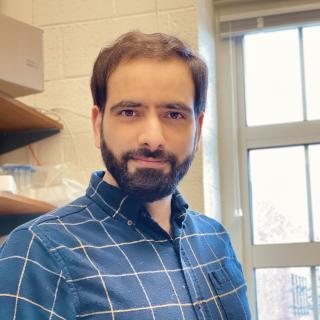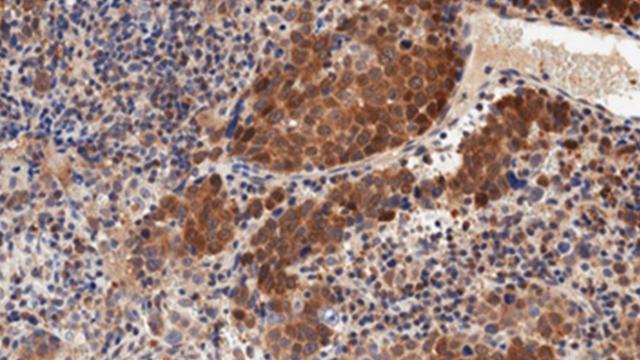Vassiliki Saloura, M.D., Ph.D
- Center for Cancer Research
- National Cancer Institute
- Building 10, Room 3B52
- Bethesda, MD, 20892
- 240-760-6352
- valia.saloura@nih.gov
RESEARCH SUMMARY
Dr. Saloura’s laboratory investigates the role of histone and non-histone protein methylation in tumor growth, therapy resistance and immunogenicity in squamous cell carcinoma of the head and neck.
Areas of Expertise
Information for Patients
Learn more about our clinical trials and the highly specialized care teams that lead them.
Vassiliki Saloura, M.D., Ph.D
Research
Protein methyltransferases (PMTs) and demethylases (PDMTs) are a class of approximately 100 enzymes that modify histone and non-histone proteins and were recently reported to be mutated, amplified and overexpressed in a significant proportion of cancers, including human-papilloma-virus (HPV)-negative head and neck squamous cell carcinoma (HNSCC).
Our laboratory aims to elucidate the role and the mechanisms through which protein methylation mediated by PMTs and PDMTs drives oncogenesis, therapy resistance and immune evasion in squamous cell carcinoma of the aerodigestive tract, with a special focus in HPV-negative HNSCC. Our goal is to develop a translational research program focusing on histone and non-histone protein methylation, and to introduce novel targeted PMT and/or PDMT inhibitors/degraders in clinical trials for head and neck cancer patients with relevant driver molecular phenotypes.
To achieve these goals, we employ a combination of high-throughput genomic and epigenomic methods, such as CUT&RUN/CUT&Tag assays combined with ATAC- and RNA-seq, proteomics-based approaches, single-cell technologies, biochemical and cancer biology assays. Experimental models include traditional cell lines, patient-derived cell lines, mouse models, organoids and tumor samples from patients with HPV-negative HNSCC.
Research efforts in the Saloura lab concentrate on three main overarching, inter-related projects:
Project 1: Elucidation of the oncogenic function of PMTs/PDMTs in HPV-negative HNSCC.
Our group aims to dissect the function of frequently amplified and/or overexpressed PMTs/PDMTs in HPV-negative HNSCC, and evaluate these as novel therapeutic targets. This entails experiments aiming to assess the catalytically-dependent and -independent functions of PMTs/PDMTs, identify direct downstream target genes, methylation substrates and interacting proteins, and evaluate prognostic significance in patients with HPV-negative HNSCC.
Project 2: The role of PMTs/PDMTs as immune modulators in HPV-negative HNSCC.
The overarching goal of this project is to dissect mechanisms through which PMTs/PDMTs affect the tumor microenvironment and antigen presentation processes in HPV-negative HNSCC, leading to decreased responses to immuno-oncologic therapeutic interventions.
Project 3: Development of inhibitors/degraders (PROTACs) targeting PMTs/PDMTs that function as oncogenic drivers in HPV-negative HNSCC.
Our group pursues the preclinical and clinical development of novel epigenetic therapeutics in squamous cell cancers of the upper aerodigestive tract, focusing on HPV-negative HNSCC, through intramural and extramural (academia, industry) collaborations.
Publications
- Bibliography Link
- View Dr. Saloura's PubMed Summary.
Epigenetic Modifiers as Novel Therapeutic Targets and a Systematic Review of Clinical Studies Investigating Epigenetic Inhibitors in Head and Neck Cancer
WHSC1 monomethylates histone H1 and induces stem-cell like features in squamous cell carcinoma of the head and neck
Characterization of the T-cell receptor repertoire and immune microenvironment in patients with locoregionally advanced squamous cell carcinoma of the head and neck
WHSC1L1-mediated EGFR mono-methylation enhances the cytoplasmic and nuclear oncogenic activity of EGFR in head and neck cancer
EGFR-based bioradiotherapy in SCCHN
Biography
Vassiliki Saloura, M.D., Ph.D
Dr. Saloura received her M.D. at the University of Athens. She completed her internal medicine residency training at Hahnemann University Hospital/Drexel University College of Medicine and her Hematology/Oncology Fellowship at the University of Chicago. She did her postdoctoral training in the laboratory of Yusuke Nakamura at the University of Chicago before joining the faculty as an instructor in 2014. In 2017, she joined the Thoracic and Gastrointestinal Malignancies Branch at the Center for Cancer Research as an Assistant Clinical Investigator and became a Stadtman Investigator in 2022.
Job Vacancies
We have no open positions in our group at this time, please check back later.
To see all available positions at CCR, take a look at our Careers page. You can also subscribe to receive CCR's latest job and training opportunities in your inbox.




